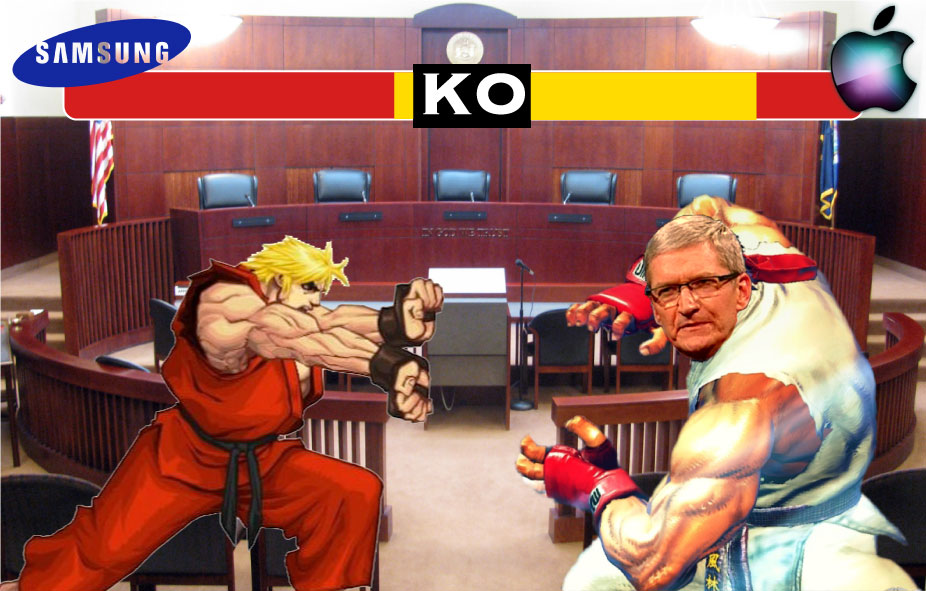Apple has made it through the bruising hand-to-hand combat of its latest patent trial, and it’s defeated all the lawyers that Samsung could throw at it. Now it’s got to face the big boss at the end: Google.
[aditude-amp id="flyingcarpet" targeting='{"env":"staging","page_type":"article","post_id":520825,"post_type":"story","post_chan":"none","tags":null,"ai":false,"category":"none","all_categories":"mobile,","session":"C"}']The jury last week handed a decisive victory to Apple, declaring that Samsung had infringed on nearly every patent under consideration. In the countersuit, the jury found that Apple hadn’t infringed on any of Samsung’s patents. It was a remarkably one-sided decision that could wind up costing Samsung more than $1 billion, if the jury’s decision and its award of damages survive the appeals that are no doubt coming. Actually, it could cost Samsung over $3 billion, if the judge decides that its willful patent infringement demands a payment of triple damages. Google has to decide how to respond before doubt about Android’s future throws more consumers into Microsoft’s arms.
But what’s Apple going to do next?
AI Weekly
The must-read newsletter for AI and Big Data industry written by Khari Johnson, Kyle Wiggers, and Seth Colaner.
Included with VentureBeat Insider and VentureBeat VIP memberships.
If I were Tim Cook, I’d keep the legal pressure on Google in order to force it to continue differentiating Android from iOS as much as possible, a process that’s already begun. Google, for instance, has already removed “bounceback” from the Android OS, a feature covered by one of the Apple patents that Samsung was found to be infringing. The latest versions of Android, Ice Cream Sandwich and Jellybean, continue their evolution away from the operating system’s early, imitative roots, with different methods for unlocking the screen, an increased use of widgets, and an approach to notifications that started out quite different from Apple’s and has only become more differentiated over time.
But Apple doesn’t have a lot to win by going after Android directly. Google gives away the OS and makes money from it only indirectly, as it encourages more people to use the company’s ad-supported services, such as Gmail and search. That’s why the most likely outcome is for Apple and Google to reach some kind of negotiated settlement.
Negotiation would have been impossible while Steve Jobs was alive, by the way. He was furious at the ways in which he perceived Google to be imitating the iPhone and vowed to “go to thermonuclear war” with the search giant to make it stop. Jobs wouldn’t have rested until Apple extracted some kind of painful concessions from Google.
Cook, however, is a more practical, approachable man: a relentless competitor, yes, but willing to negotiate when negotiation promises a better outcome at a lower cost. Rather than transform the landscape of Silicon Valley into a smoking legal wasteland, Cook will probably take the route most companies with huge patent portfolios follow: detente. Google has its own suite of mobile patents, thanks to its recently complete acquisition of Motorola, and is seeking to use them to stop the import of iPhones and iPads into the U.S. In return for calling off that threat, Cook is likely to offer Google CEO Larry Page a compromise: Don’t sue us, and don’t copy us too directly, and we won’t sue you.
A peace between Google and Apple has a chance of working, because the two companies’ fundamental businesses are so different. Apple makes its money from selling hardware and software (and to a certain extent media); Google makes its money from selling ads.
Meanwhile, expect Apple to aggressively pursue handset and tablet manufacturers whose devices — or particular implementations of Android — hew too closely to Apple’s model. These hardware makers’ revenue streams are simply too close to Apple’s to allow any sort of compromise. For Samsung, HTC, and Nokia: no mercy.
[aditude-amp id="medium1" targeting='{"env":"staging","page_type":"article","post_id":520825,"post_type":"story","post_chan":"none","tags":null,"ai":false,"category":"none","all_categories":"mobile,","session":"C"}']
Photoshop work by Tom Cheredar/VentureBeat
VentureBeat's mission is to be a digital town square for technical decision-makers to gain knowledge about transformative enterprise technology and transact. Learn More

